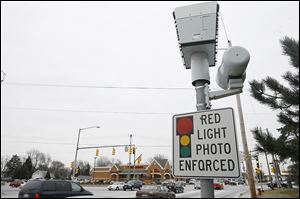
RED-LIGHT CAMERAS
State lawmakers, liberties groups oppose devices
Man challenging Toledo program
3/15/2014
Cleveland, Dayton, and Columbus, along with the broader Ohio Municipal League, have come to Toledo’s defense against a Kentucky man’s challenge to the city’s red-light cameras in the Ohio Supreme Court.
COLUMBUS — Two constitutional-rights organizations and 28 state lawmakers have sided with a Kentucky man in his Ohio Supreme Court challenge of Toledo’s red-light and speed-enforcement cameras, arguing that the city’s law makes police both judge and prosecution.
Meanwhile, Cleveland, Dayton, and Columbus, along with the broader Ohio Municipal League, have come to Toledo’s defense, knowing that if one city’s program falls, their own likely will follow. They argue that their home-rule authority is in danger.
The American Civil Liberties Union of Ohio, in a brief supporting Bradley L. Walker’s challenge, argues that Toledo’s ordinance wrongly puts appeals of citations in the hands of an administrative arm of Toledo police and provides an arbitrary deadline for those cited to pay their civil fines or make the case they weren’t driving the car at the time.
“An even stronger case for safeguards exists in the present case because the city government is incented not to provide safeguards, not just because of the administrative cost, but because the government benefits from the very lack of safeguards, since it collects and retains some of whatever penalties it may assess,” the brief filed by Freda J. Levenson for the ACLU said.
Mr. Walker paid the $120 fine within the 21-day time limit after receiving notice from the city that a camera had caught his vehicle violating a traffic law. He didn’t seek an administrative appeal but, through Fremont attorney Andrew Mayle, later sued the city and RedFlex Traffic Systems, the private company operating the cameras.
The case was dismissed by a Lucas County Common Pleas judge, but that decision was reversed last year. The 6th District Court of Appeals found 2-1 that Toledo had created a review process that should be handled in Toledo Municipal Court.
“At the end of the day, due process means that you get to see a judge before government takes your money or your car,” said Maurice Thompson, executive director of the 1851 Center for Constitutional Law, which filed a brief supporting Mr. Walker.
“Through these camera agreements, Ohio’s local governments are essentially selling to private corporations the right to fine their citizens and take their vehicles,” he said. “We believe that it’s time to end this practice.”
Twenty-eight lawmakers signed on to the 1851 Center’s brief, an indication of the political fight being waged in the General Assembly over the future of these cameras. No northwest Ohio lawmakers were among them.
The Ohio House voted 61-32 last year to all but ban traffic-law enforcement cameras, limiting their use to school zones of 20 mph and even then only when a police officer is present. No action has yet been taken in the Senate, where seven senators are supporting Mr. Walker’s position.
State Sen. Kevin Bacon (R., Columbus) has offered competing legislation to provide uniform standards for the operation of such programs instead of killing them.
The statehouse is exactly where this fight belongs, the city of Toledo contends in its brief.
“The debate as to the efficacy of the cameras plays out politically on an almost regular basis in the General Assembly and on various city councils,” Adam Loukx, the city’s law director, and Andy Douglas, a former Supreme Court justice and Toledo city councilman, said in their brief.
“This ongoing debate is fitting because it is in these various legislative bodies where the future of photo enforcement should be decided rather than in court on the basis of a strained interpretation of jurisdiction,” the city wrote.
Offenses recorded by a red-light or speed camera are civil violations. They carry fines of $120, but no points are assessed against a driver’s record and violations are not reported to insurance companies, as would occur with criminal violations.
The owner of a vehicle caught on camera has 21 days upon receipt of the citation to pay the fine, indicate that someone else was driving the vehicle, or seek an administrative appeal. The administrative decision is subject to appeal to a court.
The city contends that the 6th District erred when it determined that only the General Assembly could create a new administrative hearing process, a ruling it maintains flies in the face of a city’s home-rule authority.
“The stakes in this case are high,” the city argues. “While it is conceivable that in any given session the General Assembly may take action to curb the use of ‘red-light cameras’ on a statewide level, such an action would not do the damage to Toledo and other cities as allowing an erroneous decision of the majority below to stand.”
The latest state legislative move against traffic cameras resulted from outrage over the suburban Cincinnati village of Elmwood Place, whose program was shut down by a judge who declared it to be a “scam that motorists can’t win.”
Contact Jim Provance at: jprovance@theblade.com or 614-221-0496.